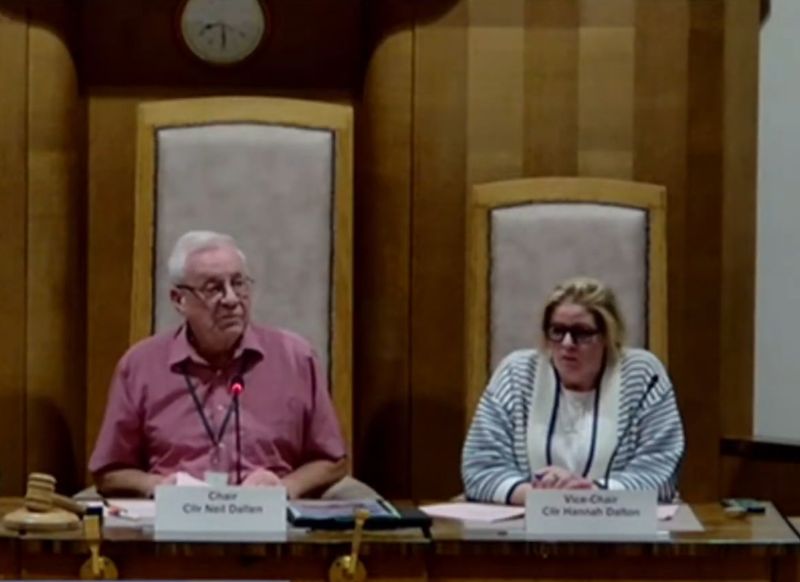Epsom and Ewell Borough Council has no choice but to vote for its own demise
Epsom and Ewell Borough Council Divided Over Local Government Reorganisation
An extraordinary meeting of Epsom and Ewell Borough Council was held on 18th March 2025, where councillors engaged in an extensive and, at times, heated debate over the future structure of local government in Surrey. The meeting, convened in response to the Government’s English Devolution White Paper, saw councillors grapple with the contentious question of whether Surrey should be reorganised into two or three unitary authorities.
Abolition of Epsom and Ewell Borough Council Inevitable
Councillor Hannah Dalton, (RA Stoneleigh) Chair of the Standards and Constitution Committee and ruling Residents Association leader, acknowledging the gravity of the decision before the Council. “Tonight, colleagues, you have before you a report which will undo 50 years of local government,” she said. She stressed that while she would not have chosen this path, reorganisation was now unavoidable due to central government’s ambitions for devolution.
Dalton proposed a motion advocating for the creation of three unitary authorities in Surrey, arguing that this model would better maintain local democracy and ensure decision-making remained close to residents. She cited concerns that larger unitary councils could become remote and unresponsive, particularly to distinct local needs such as those of urban Epsom versus rural areas further south.
The Case for Two Unitaries
However, opposition to the three-unitary model came swiftly. Councillor Bernie Muir (Conservative Horton) raised concerns that splitting Surrey into three could strain service delivery, particularly for essential areas like adult social care and children’s services. “It’s not just about population size, but the nature and needs of our communities,” she stated, highlighting the complexities of recruiting skilled staff across multiple authorities and the risks of disrupting services that are already under strain.
Echoing these concerns, Councillor Julian Freeman (Liberal Democrat College), who served Sutton Council for several years, warned against prioritising political considerations over operational efficiency. “Dividing an already overstretched county into three is not going to fix its problems,” he said. Freeman pointed to Surrey County Council’s existing financial difficulties, suggesting that smaller councils might lack the resources to deliver critical services effectively.
Democracy and Accountability at Stake
Others, including Councillor James Lawrence (LibDem College), pushed back, advocating for three unitaries as a way to preserve local democratic accountability. He cautioned against forming excessively large authorities, citing the example of North Yorkshire’s unitary council, which has struggled to maintain strong community ties. “If we follow Surrey County’s preference for two unitaries, we risk creating councils that are simply too large for residents to engage with effectively,” he argued.
Meanwhile, Councillor Alan Williamson (RA West Ewell) expressed frustration with the process, describing the reorganisation as being “railroaded through” by the Government. “This is not about efficiency or saving money; it’s about centralising power,” he said. Nevertheless, he reluctantly backed the three-unitary model as the closest approximation to Epsom and Ewell’s current system.
Cllr John Beckett (RA Auriol) said “Money is driving this. You look at all of the reports that support whether it’s a two unitary or a three unitary. It’s down to pounds, Shilling and pence. I personally feel that our residents will lose out it.”
Cllr Christine Cleveland (RA Ewell Village) said “We’re Residents Association. I’m proud to be a residents association councillor, because I think that brings me right smack back into the local people where we live, and that’s who I care about, and that’s who I’m hoping to represent. I think the bigger you do these authorities, the less that voice is heard.”
Cllr Clive Woodbridge (RA Ewell Village) said “I am sceptical that local government reorganisation will bring many benefits for our residents. The savings won’t be as much as predicted, the costs will be far higher, and we will end up with a local government structure that is far less local than before. What is being proposed is not devolution, but to a large extent the reverse, taking many decisions about the services that local government delivers further away from residents and more towards the centre”.
Labour councillors also contributed to the debate, with Councillor Chris Ames (Court) raising concerns about transparency and the accessibility of council discussions. “This is a public meeting. We shouldn’t be putting things in code that are baffling to the public, that we’re asking to engage in our democracy,” he said, urging fellow councillors to ensure their discussions remained comprehensible to residents.
Councillor Kate Chinn (Labour Court) added that while the reorganisation was inevitable, it was vital to ensure that it worked for all residents. “The Labour Party tried to make the districts and boroughs fit better, and it’s quite difficult because of the different socio-economic differences in different boroughs and districts,” she remarked. She praised the efforts made in the proposal, stating, “They’ve done the best we can do, and I don’t see why we’re noting it and not voting to approve it”
What Happens Next?
With emotions running high, the meeting, following an amendment of Cllr Alex Coley (RA Ruxley) to approve not merely note, ultimately saw councillors vote to approve the submission of the interim proposal to Government, with a majority supporting the three-unitary preference. This recommendation will now be submitted as part of Surrey’s interim plan for reorganisation, though the final decision will rest with the Government.
Local residents are encouraged to follow developments closely, as the reorganisation will have a profound impact on how services are delivered in Epsom and Ewell in the years to come. The debate may be over in the council chamber, but the future of local government in Surrey remains uncertain.
Related reports:
Who will be saddled with Spelthorne’s and Woking’s £3 billion debts?
Local Government Reorganisation in Surrey: Key Proposals
An independent view on Epsom and Ewell Council’s future















